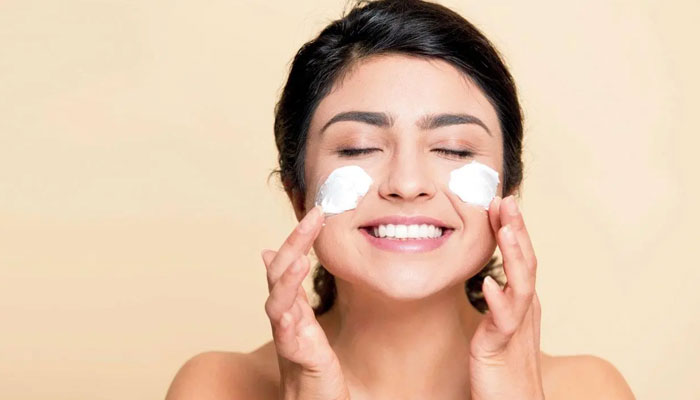
Certain skincare ingredients are known for their ability to brighten the complexion. Camu camu, for example, is an Amazonian berry rich in vitamin C. This powerful antioxidant evens the look of discolouration and lightens the appearance of dark spots.
Another glow-boosting ingredient is liquorice root extract. It’s excellent for fighting hyperpigmentation and reducing the appearance of large pores.
Cleanse Daily
Cleansing is the first step to healthy and glowing skin. It removes all of the dirt, makeup, and pollution your face has accumulated throughout the day so that any additional skincare products and treatments can work more effectively. Make sure to use a gentle cleanser suitable for your skin type. It’s also important to wash your hands properly before washing your face. This will help to reduce bacteria and prevent any breakouts or irritation on the skin.
While you can get away with skipping cleansing occasionally, it’s essential to make this a regular part of your routine if you want to achieve precise and radiant skin. The best way to do this is by using a double-cleansing technique. This involves using a cleansing oil, balm or milk as the first step to remove all of the makeup, sunscreen and pollution that your skin has accumulated over time, and then following it with a light foam or gel cleanser to give your skin a deep clean.
The best cleanser for your skin type will depend on the severity of your concerns and how oily your complexion is. If you have oily or combination skin, a foaming cleanser is usually the best choice as it will help to control excess sebum production. However, a liquid soap or cleansing gel may be more appropriate for those with very sensitive or dry skin.
For those with stubborn hyperpigmentation, many treatments can help fade dark spots and even out the complexion. For example, a popular ingredient loved by people with pigmentation issues is liquorice root extract, which helps to lighten the look of dark spots and make them less noticeable.
Exfoliate Regularly
The skin can accumulate dead skin cells, contributing to dullness and rough texture. Regular exfoliation removes those cells, leaving your face feeling smooth and hydrated. It also helps other skincare products penetrate more deeply into the skin because they aren’t blocked by a layer of dead skin.
There are several ways to exfoliate your skin, from physical scrubbing with a brush or washcloth to chemical peels and microdermabrasion. However, finding the right balance is essential so you don’t overdo it. Over-exfoliating can cause damage to the skin, causing redness, sensitivity, and blotchiness. An excellent way to avoid overdoing it is to start slowly and gradually increase the number of times you exfoliate a week, observing how your skin responds each time. If you’re considering incorporating exfoliation into your skincare routine and looking for related products, you can explore Skin Care Coupon Code options to save on skincare items.
Another benefit of exfoliating is that it can help prevent clogged pores and blemishes by removing excess oil and dead skin cells from the surface of your skin. Regularly removing the outermost layers of dead skin cells can keep pores clear and free of black and whiteheads.
To ensure you’re not overdoing it, always use a gentle exfoliant and never rub your skin too hard when scrubbing. Over-exfoliating can leave the skin sensitive and irritated, so it’s best to stick to two to three times a week for most skin types.
Remember to follow up with your favourite moisturizer after exfoliating to lock in hydration and nourish the skin. And be sure to drink plenty of water as well—proper hydration is vital to healthy skin! You can also hydrate your skin from the inside out by eating a healthy diet filled with many fruits, vegetables and whole grains.
Hydrate
Hydration is the foundation for a clear and glowing complexion. It helps to maintain the skin barrier, which serves as a natural shield against pathogens and harsh environmental elements. If your skin is dry or cracked, it can make these elements easier to penetrate and cause damage. To help keep your skin hydrated, try drinking plenty of water throughout the day and applying a moisturizer with shea butter or aloe vera after cleansing. You can also use a face mist to give your skin an extra hydrating boost.
A healthy diet is another key to hydrated skin. Eat a variety of fruits and vegetables rich in water, antioxidants and other nutrients that can improve the appearance of your skin. Water-rich foods include tomatoes, avocados, cucumbers, berries and leafy greens. These foods will give your skin the hydration it needs to look and feel healthy and glowing.
Consider using a hydrating serum in your skincare routine to take your hydration up a notch. These serums are designed to go on top of your usual moisturizer and can be used both morning and night for smoother, more hydrated skin. Some hydrating serums are packed with vitamins that can also enhance your skin’s clarity and glow, such as Vitamin A and Vitamin E. To further hydrate your skin, you can also try a facial that utilizes shea butter and other natural ingredients to soothe and moisturize the skin. Those with sensitive skin will benefit greatly from this kind of treatment. You can even choose a fragrance-free facial to avoid irritating your skin further. Suppose you want to enhance your skincare routine and save on related products or services. In that case, you can explore the Healthy Life Discount” options to potentially get discounts on skincare items and treatments.
Protect from Sun Damage
While we all know that fun in the sun is a good thing, protecting your skin from the sun’s harmful UV rays is essential. The sun’s UVA and UVB rays can cause premature skin ageing, dark spots, wrinkles and even skin cancer. Building a daily sun protection routine into your beauty regimen is best. This includes sunscreen, protective clothing and a hat (ideally with a brim that shades your face, ears and back of the neck).
By the time you feel the burn from a sunburn, it’s already too late to prevent UV damage. In fact, sunburns are actually a sign of DNA damage, and repeated exposure to the sun can increase your risk for skin cancer.
UV rays can also cause the breakdown of collagen and elastin in your skin, contributing to fine lines and wrinkles. They can also weaken the framework of your skin, causing it to sag and loosen over time. The good news is that the effects of sun damage can be reversed with a healthy diet, exercise and a daily skincare routine that incorporates effective sun-damaged skin treatments.
Be sure to use a broad-spectrum sunscreen with an SPF of at least 30 daily and reapply regularly. Look for a sunscreen that contains retinol, alpha hydroxy acid or vitamin C. These ingredients help to brighten the appearance of existing dark spots and promote a more even skin tone. Double cleansing with an oil-free gel or gentle cleanser like GH Beauty Lab test winner Neutrogena Hydro Boost Water Gel can lift off sunscreen residue and leave the complexion feeling smooth, soft and glowing. After cleansing, apply a moisturizer to lock in hydration and continue rejuvenating.
Nourish with a Healthy Diet
Everyone aspires to have silky smooth, radiant skin. While genetics and environmental factors play a significant role, healthy skin can be achieved through proper skincare and diet.
It’s no secret that your diet significantly influences your appearance. A diet rich in antioxidant-rich fruits and vegetables can help promote glowing, clear skin. Choose a variety of fresh produce to get your 5 a day, and add some superfoods like berries, tomatoes, avocado and kale. These foods are a good source of beta-carotene, which can prevent sun damage and premature ageing, lutein, which can lighten discolouration and elasticity, and vitamin C, a potent anti-inflammatory promoting healthy-looking skin.
Other essential nutrients for glowing skin include omega-3 fatty acids, which can be found in walnuts, chia seeds and flaxseeds. Omega-6 fatty acids, found in avocados and healthy oils such as sunflower and safflower oil, can help keep your skin hydrated by keeping cell walls supple.
Finally, consuming plenty of water is a must for glowing skin. Water can help flush toxins from the body and improve circulation, which leads to a more even complexion. For best results, drink 1.5 to 2 litres of water a day.
While a few of these tips may seem obvious, they’re often overlooked. By following a simple routine and consuming a healthy diet, you can achieve glowing skin that will outdo any makeup product! For more expert advice, contact one of our licensed estheticians, who can give you personalized guidance and recommend additional steps to help you get the glow you’ve always wanted.
Conclusion
Achieving clear and glowing skin requires consistent effort and a holistic approach. Anyone can achieve their desired complexion by practising good skincare habits, maintaining a healthy lifestyle, and seeking professional guidance when necessary. Remember to be patient and kind to your skin; your efforts will pay off in the long run.








